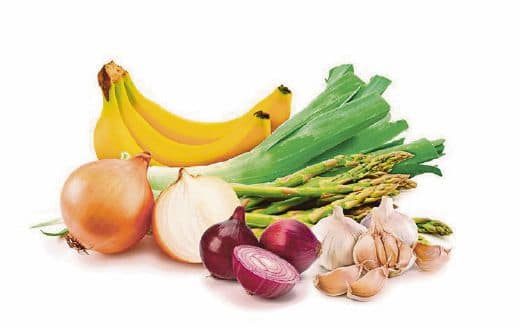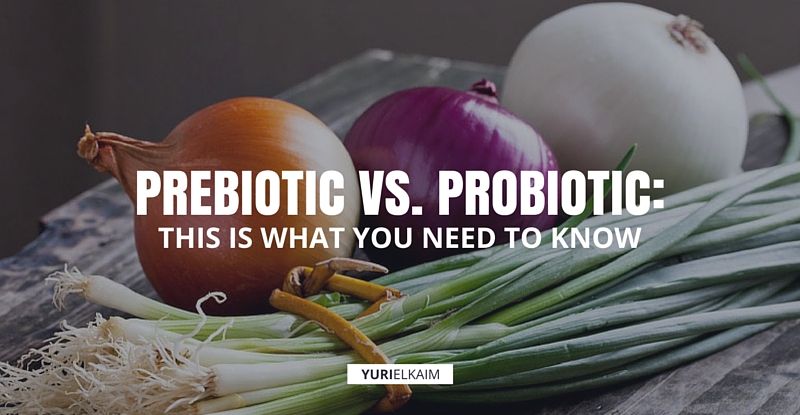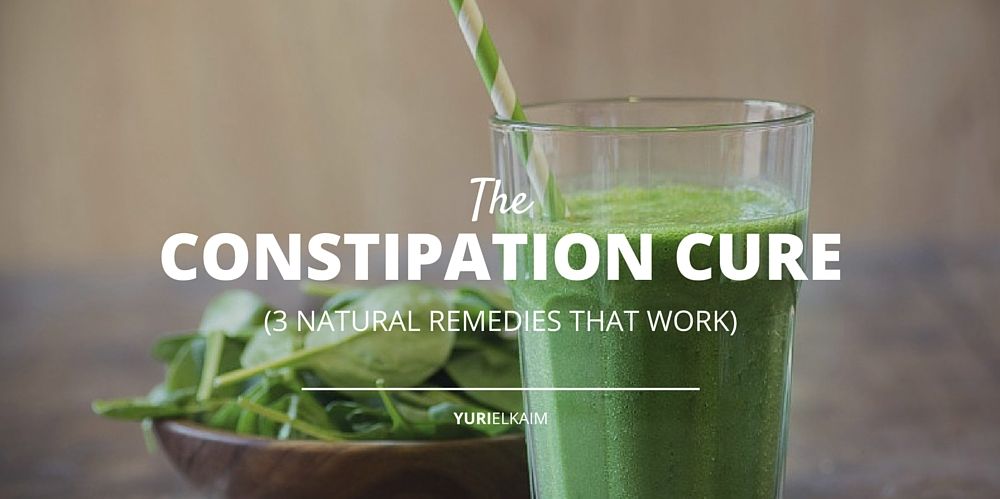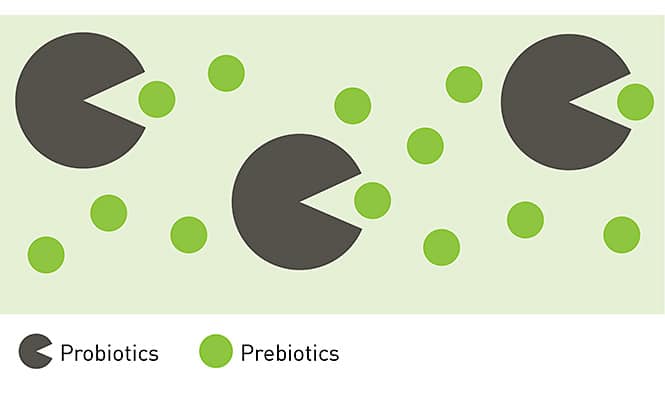You’ve most likely heard of probiotics before: You know, those friendly little gut bacteria that keep your digestive system squeaky clean and help you digest the foods you eat. But we don’t hear much about prebiotics, even though they’re just as important.
In this article
In fact, without prebiotics, the probiotics in your gut would be out of luck. That’s because prebiotics feed them the nutrients they need to grow and do their job.
Although they sound the same, prebiotics and probiotics are entirely different from each other, each contributing their own unique health benefits to your gut. So what exactly is the difference between prebiotics and probiotics?
What are prebiotics?
Prebiotics are a type of nondigestible fiber found mostly in plants and other carbohydrates.
They contain the nutrients that nourish the existing good bacteria – or probiotics – in your gut. Prebiotics have also been named superfoods or “fertilizers,” as they allow beneficial bacteria to grow.
Since they’re found in many plant fibers, prebiotics are easy to obtain from your diet if you eat a wide variety of plant-based foods.
Prebiotics can also be found in higher concentrations in nutritional supplements at your local health food store, especially fiber supplements or the supplements used in “bowel cleansing” protocols.
The most common varieties of prebiotics are fructooligosaccharides (also known as fructans) and galacto-oligosaccharides.
Approximately 80 percent of your immune system is located in your gut, which suggests how important it is to keep it functioning optimally by having a healthy ratio of probiotics, or friendly bacteria, in your system (1).
Prebiotics may also help improve with vitamin and mineral absorption – especially vitamin B and calcium, since both nutrients are absorbed in the gut (2).
[Related: The 3 Best Natural Cures for Constipation]
Prebiotics may also contribute to relieving symptoms of irritable bowel syndrome (IBS), such as bloating and diarrhea.
The importance of obtaining prebiotics from our diet cannot be understated. That’s why prebiotic-rich foods are on my list of ultimate superfoods. Without prebiotics, the good bacteria in our gut wouldn’t be able to grow or thrive, which means our health would become severely depleted.
What are probiotics?
Probiotics consist of live bacteria and sometimes yeasts that are present in specific foods and supplements. These live microorganisms, when consumed in sufficient quantities, confer health benefits.
Often referred to as ‘good bacteria’ or ‘friendly bacteria’, probiotics are beneficial to our health.
These types of bacteria are naturally found in your body, primarily in the gut but also in other areas. They help maintain a healthy balance and contribute to your overall well-being. By eating foods or taking supplements that contain probiotics, you support and enhance the functions of these existing bacteria.
What is the difference between prebiotics vs. probiotics?
When comparing prebiotics vs. probiotics, there are a few key differences. For example, prebiotics are found in the fiber of carbohydrates, while probiotics are found in fermented or “living” foods.
Also, probiotics are beneficial bacteria that exist in your gut, while prebiotics act as food for probiotics to grow.
It’s important to understand that it’s not about choosing between prebiotics and probiotics. Rather, they complement each other to keep our bodies healthy and balanced.
Probiotics are considered living bacteria that help digest the foods you eat, while prebiotics are considered nutrients.
When comparing probiotics and prebiotics in supplement form, probiotics aren’t always able to survive the harsh, acidic temperatures of stomach acid – but prebiotics are. This could make them more helpful to repopulate the body’s stores of good bacteria than an actual probiotic supplement.
Can you take prebiotics and probiotics together?
Combining prebiotics and probiotics is generally safe and is known as ‘microbiome therapy‘. There’s also no evidence indicating any harm in taking them together.
If you’re considering prebiotic and probiotic supplements, it’s advisable to consult with a healthcare provider, especially if you suffer from a chronic illness or a serious health condition. This consultation can provide you with tailored advice.
How to Get Prebiotics Naturally
You can get more prebiotics in your diet by increasing your intake of fibrous, prebiotic-containing foods.
Here are the top foods known to contain the highest concentrations of prebiotic-rich fructans or galacto-oligosaccharides:

- Chicory root
- Jerusalem artichoke
- Dandelion greens
- Onion
- Asparagus
- Leeks
- Banana
- Garlic
- Prebiotic supplements
Since cooked leeks, asparagus, and onion can be difficult to digest in their raw form, I do recommend eating them lightly steamed. However, you will receive fiber from both the raw and cooked forms, which is where the prebiotics are found.
Inulin is an example of a fructooligosaccharide that acts as a prebiotic, and it’s found in many fruits and vegetables. Inulin is also found in high concentrations in chicory root. This explains why chicory root is one of the most common ingredients in supplements for improved digestive health.
Prebiotic supplements will typically contain several different types of fiber and prebiotics, such as chia seeds and flax, as well as chicory root.
Side Effects of Prebiotics
Although it’s clear that prebiotics are necessary for optimal gut health, prebiotics have been known to aggravate those who already have existing digestive conditions, such as SIBO (small intestinal bacterial overgrowth).
In some cases, prebiotics can help eliminate digestive symptoms such as gas and bloating. However, in some people, the symptoms can worsen with increased fiber.
Prebiotics can aggravate existing digestive symptoms because once the digestive process starts and the friendly bacteria begin to break down their indigestible fiber, gas is naturally produced.
Prebiotics Make Your Gut Happy
For the average healthy person, prebiotics are an entirely safe nutrient to add to your diet that will help keep your gut in sparkling condition.
Now that you understand how prebiotics work in the body, you may also be interested in learning more about what probiotics can do for you. I’ve written an entire post about the pros and cons of probiotics and why you might (or might not) want to include them in your diet.
Frequently Asked Questions (FAQs)
Got more questions about prebiotics and probiotics? Check out some frequently asked questions about this topic below.
Which is better, probiotic or prebiotic?
Choosing between probiotics and prebiotics isn’t about which is better, as both play essential roles in gut health. Probiotics introduce beneficial bacteria into your digestive system, while prebiotics provide the necessary nutrients to feed and sustain these bacteria. Ideally, a balanced intake of both probiotics and prebiotics is recommended to maintain optimal gut health and overall well-being.
Who should avoid prebiotics?
Individuals with Small Intestinal Bacterial Overgrowth (SIBO) or intolerance to FODMAPs should steer clear of prebiotics.
When is the ideal time to take prebiotics and probiotics?
Probiotics can be taken at any time of day. The optimal time to take them is whenever you are most likely to remember consistently. Most studies on probiotics do not prioritize timing, as noted by experts.
Should I take prebiotics or probiotics first?
It’s advisable to take your prebiotic about 10 to 15 minutes after your probiotic. This spacing prevents premature interaction between the two, which can cause bloating if they mingle before reaching the large intestine. Ideally, take your probiotic first and on an empty stomach.
Banish Bloat By Tomorrow
Jumpstart your feelings of well-being in 24 hours with my 1-Day Detox plan, which contains a day’s worth of mouthwatering “cleansing” meals. Bust sugar cravings, boost your energy, and – yes – help cut back stomach bloat with this simple detox.
You can get it – for FREE – right now by clicking the banner below.



